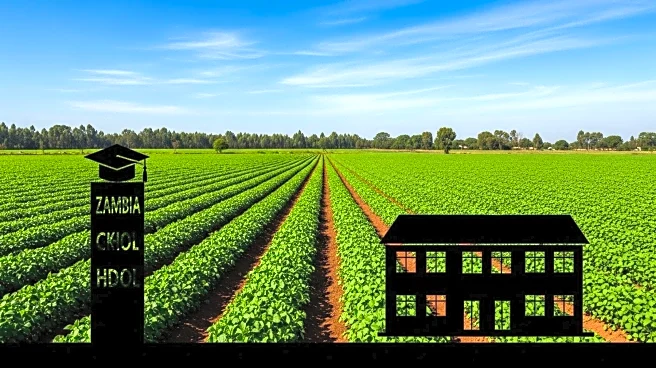What's Happening?
The African Development Fund (ADF), part of the African Development Bank Group, is significantly impacting Zambia's agriculture and education sectors. During a meeting in Zambia's capital, ADF deputies visited key project sites, including the Nitrogen Chemicals of Zambia fertilizer plant and upgraded facilities at the University of Zambia. The ADF's investments are helping Zambia transition from drought conditions to a surplus in food production, with the country producing over 3.7 million metric tons of food in the 2024/25 season, surpassing its national needs. The Zambia Emergency Food Production initiative, supported by the ADF, has aided nearly 5,900 farmers, with a focus on women, through subsidized seeds and fertilizers. Additionally, the ADF's investment in education is modernizing facilities at the University of Zambia, enhancing learning environments for 250,000 students.
Why It's Important?
The ADF's initiatives in Zambia are crucial for fostering economic growth and stability in the region. By supporting agriculture, the Fund is helping Zambia achieve food security and surplus, which positions the country as a competitive player in the regional fertilizer industry. This development is expected to reduce fertilizer costs by 40%, benefiting smallholder farmers and promoting self-sufficiency. In education, the modernization of facilities at the University of Zambia is expanding access to quality education, which is essential for societal peace and democracy. These efforts contribute to a more resilient agricultural system and empower local farmers, reducing dependence on imports and enhancing regional competitiveness.
What's Next?
Zambia is poised to penetrate export markets between 2025 and 2030, leveraging its surplus in food production and competitive position in the fertilizer industry. The continued support from the ADF is expected to further reduce fertilizer costs and expand the reach of the Zambia Emergency Food Production initiative. In education, the ongoing modernization of facilities will continue to improve learning environments, potentially increasing the number of students benefiting from enhanced educational opportunities. These developments are likely to attract further investment and support from international stakeholders, reinforcing Zambia's role in regional development.
Beyond the Headlines
The ADF's investments in Zambia highlight the broader impact of international financial support in transforming fragile economies. By focusing on agriculture and education, the Fund is not only addressing immediate needs but also laying the groundwork for long-term economic resilience and social stability. These efforts underscore the importance of concessional financing in promoting peace and democracy through sustainable development, offering a model for other low-income and conflict-affected countries.









